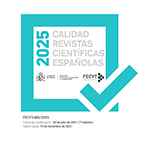Official Development Assistance and Institutional Context as Factors of Growth and Progress: Comparative Cases of Honduras and Costa Rica
Abstract
The evolution of the countries belonging to spaces or regions in development offers situations and trends that highlight the existence of strong socio-economic contrasts and of governance between one and the other. In Latin America, countries with similar characteristics, located in the same geographical area and that share both historical processes that generate inequality (process colonization / decolonization) and sociocultural roots (Hispanic world) that act as an element of identity, show evident today contrasts in terms of socioeconomic model, level of development and opportunities to progress. Honduras and Costa Rica, the two empirical cases object of this analysis, illustrate situations of this disparity with results that allow get some lessons. As a premise, it is accepted that the success or failure of these countries depends on the type of institutions that support their political and economic structure, because depending on whether they are inclusive or extractive they can promote or block development, according to the Theory of the Elites Extractive. In this context, Official Development Assistance (ODA) can become a factor of influence, but its effectiveness will depend on how it is managed by the national institutions that receive it, as well as the criteria that motivate it, the sectors those that apply and the interests / involvement of donors. The results obtained illuminate a complex reality that does not contradict the proposals for or against ODA, which leaves the debate open and emphasizes that the explanation for the unequal development and growth of the countries is multifactorial. What does not invalidate the effort to seek answers that help understand each case and facilitate decision making.Downloads
Article download
License
In order to support the global exchange of knowledge, the journal Geopolítica (s) Revista de estudios sobre espacio y poder is allowing unrestricted access to its content as from its publication in this electronic edition, and as such it is an open-access journal. The originals published in this journal are the property of the Complutense University of Madrid and any reproduction thereof in full or in part must cite the source. All content is distributed under a Creative Commons Attribution 4.0 use and distribution licence (CC BY 4.0). This circumstance must be expressly stated in these terms where necessary. You can view the summary and the complete legal text of the licence.









